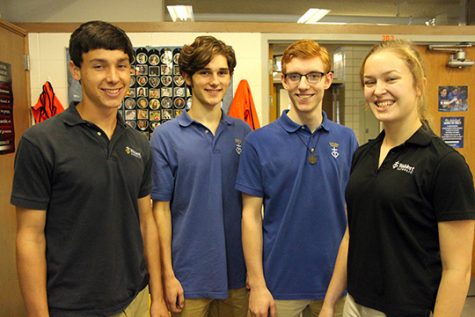4 Wahlert students semifinalists in the National Merit Scholarship Program

After taking the PSAT, which doubles as the National Merit Scholarship Qualifying Test, their junior year, four Wahlert students, Jacob Berning, Aidan McSperrin, Michael Banwarth and Lela Udry, ‘17, found out their scores were high enough to make them National Merit Scholar Semifinalists. The National Merit Scholarship Program recognizes outstanding achievement on the PSAT test by rewarding top performers with the opportunity to compete for generous scholarships.
“I was, of course, incredibly honored,” Banwarth said. “I thought the test went fairly well when I took it, but that really doesn’t mean all that much. Since the cutoffs for commended and semifinalists change every year, it’s difficult to know how you did until a little after the test, and even then it isn’t for certain.”
“I thought that there had probably been some mistake,” Udry said.
“I had no reaction, really,” Berning said. “It kind of felt weird getting so many congratulations over a test score. I appreciate the honor, but it’s not my most prized award. It’s just a test score.”
What does it mean to be a semifinalist? At this stage, it can be hard to tell. Semifinalists represent the top .5 percent of the total number of juniors who took the PSAT in each state. Once students are named semifinalists, they must complete an application to be considered a Finalist. The application includes information about extracurricular activities, leadership positions, and academic record, as well as essays and an endorsement from a school official.
“So far, it means that you answer a lot of questions about what it means to be a semifinalist,” Udry said. “Personally, I don’t really know.”
“To be a semifinalist means that you can apply to become a finalist and possibly be selected for scholarships,” Banwarth said.
Each year, the school tries to encourage students to prepare for the test, often by setting up review sessions, but since the PSAT is designed to test critical reading ability, mathematics problem-solving ability, and writing ability, not cumulative knowledge, it can be hard to find an effective way to study.
“I attended some of the seminar sessions to prepare, mainly for the math sections,” Banwarth said. “It had been a while since I had done some of the math that I knew could be on the test, and I needed to brush up on my algebra!”
“I went to one of those preparation meetings for math, realized there was no way I could do well in the math section, and then gave up on studying,” Udry said.
Berning admits to a different kind of preparation. “I went to school since Kindergarten,” Berning said. “That’s about it.”
“A big part of standardized testing is if the test ‘agrees with you’ or not,” Banwarth said. “Some tests are more suited to your strengths than others.”




